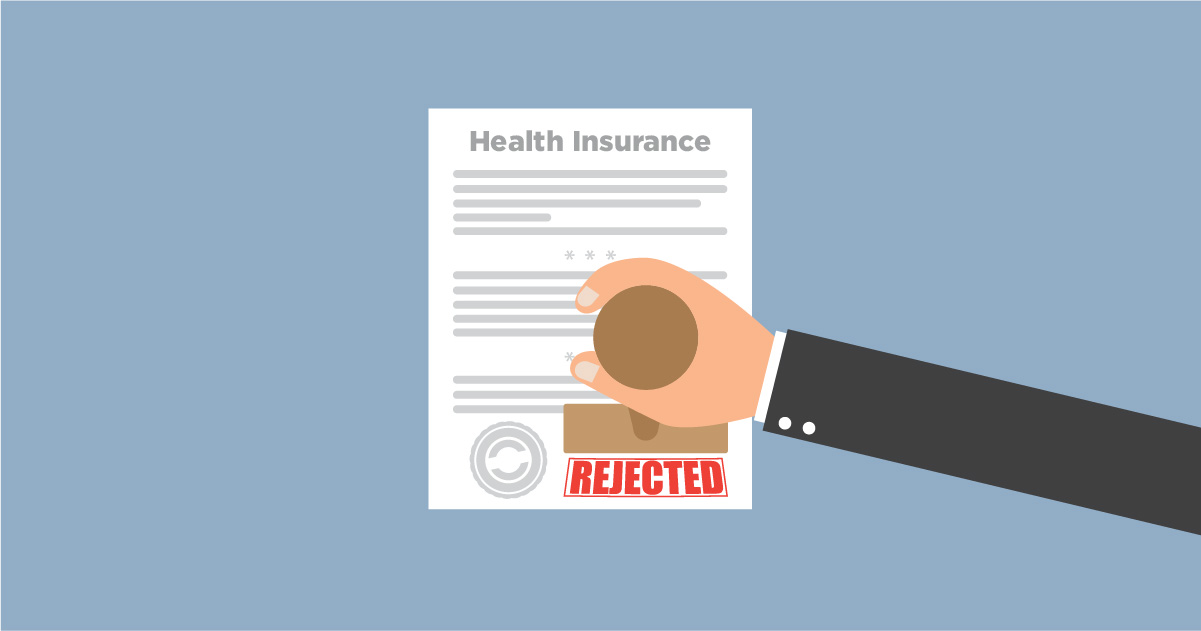Medical emergencies are already stressful, and navigating health insurance claims can add to policyholders' challenges. Claim repudiation happens when an insurer denies reimbursement even after processing the claim, while claim rejection occurs due to errors or discrepancies in the submitted details. Knowing the reasons behind these issues is essential to avoid them.
In this blog, we will understand in detail the process of claim rejection and claim repudiation in health insurance.
- What is Claim Rejection?
- Top Reasons for Claim Rejection
- What is Claim Repudiation?
- Top Reasons for Claim Repudiation
- Claim Rejection vs Claim Repudiation
What is claim rejection?
Health insurance claim rejection happens before the insurer processes the claim, often due to filing incorrect information about factors like pre-existing diseases, age, or occupation. Unlike claim repudiation, where the claim is denied after processing, rejection happens when it fails to meet the policy's specific criteria.
When a claim is rejected, the policyholder is informed of the exact reason. To prevent this, it's crucial to ensure all details—medical history, diagnoses, and procedures—align with the policy's terms, including exclusions and limitations. In many cases, a rejected claim can be resubmitted after making the necessary corrections and providing additional required information.
Top Reasons for Health Insurance Claim Rejection
- Health insurance policies never cover all treatments and services. If a claim includes something that is excluded, there is are high chance of the claim being rejected.
- If documents are missed, not adhere to the policy terms and conditions, the claim can be denied.
- Making errors like filing duplicate claims, incorrect codes, or charges can cause claim rejection.
- If the treatment is not needed or does not match policy guidelines, the claim may not be approved.
- If they suspect fraud, the claim will be denied.
- If the policyholder has not paid premiums or the policy has lapsed, the claim will not be covered.
What is claim repudiation?
Health insurance claim repudiation occurs when an insurer begins processing your claim but rejects making payment due to non-compliance with the policy's terms and conditions. When a claim is repudiated, the insurance company provides the policyholder with a written explanation of the decision.
In such cases, policyholders may need to appeal by submitting additional information, documentation, or evidence to support their claim. To avoid claim repudiation, it is essential for policyholders to thoroughly understand their health insurance policy and seek guidance from insurance advisors or legal professionals when needed.
Top Reasons: Health Insurance Claim Repudiation
- Exclusions or any other specific treatment, conditions, or services that are excluded in your policy. If a claim request is raised for the same, then it will lead to claim repudiation.
- If the claim is for any pre-existing diseases.
- Submitting incomplete documents, like missing medical bills, prescriptions, or medical records.
- In case a policyholder violated any policy terms and conditions, in that case, the claim can be repudiated.
- If the policyholder has not paid premiums or has any policy lapses, the claim submitted may not be covered and repudiated.
Claim Repudiation Vs Claim Rejection
|
Parameters |
Claim Rejection |
Claim Repudiation |
|
When it happens |
Before the start of the Claim process |
After claim processing is completed |
|
Reason |
Errors found in the claim form, missing documents, incorrect details, or policy lapses |
The claim does not adhere to the policy terms and conditions. |
|
Examples |
Wrong billing codes, incomplete paperwork, and policy expiration. |
Treatment excluded from coverage, fraudulent claims, and false information. |
|
Can It Be Resubmitted? |
Yes, after rectifying errors and providing the required documents. |
Difficult, but possible through an appeal with strong evidence. |
Steps to Avoid Claim Rejection & Repudiation
- Ensure all personal and medical details are accurate
- Submit complete and correct documentation
- Understand policy inclusions and exclusions
- Pay premiums on time to keep the policy active
- Seek professional guidance if needed
Bottom Line
To ensure a smooth claim process, policyholders must be aware of their policy terms, submit accurate documents, and pay premiums on time. While claim rejections can often be corrected, claim repudiations require careful attention to policy conditions. Being informed and proactive can help policyholders avoid unnecessary claim denials and receive the benefits they deserve.
FAQs
What is the difference between claim rejection and claim repudiation?
Claim rejection occurs when the insurance company refuses to process a claim due to errors, missing documents, or incorrect details. It happens before the claim is reviewed.
Claim repudiation happens after the claim is processed, but is denied because it does not meet the policy’s terms and conditions.
Can a rejected health insurance claim be resubmitted?
Yes, if the reason for rejection was incorrect details or missing documents, you can correct the errors and resubmit the claim for processing.
Will my claim be rejected if I get treatment from a non-network hospital?
If you opt for a non-network hospital, you may have to go for reimbursement claims instead of cashless claims. However, if your policy allows reimbursement and all documents are in place, your claim should not be rejected.
Who can help me if my claim is wrongly rejected or repudiated?
You can:
- Contact your insurance provider’s grievance department.
- Seek guidance from an insurance advisor.
- Approach the Insurance Ombudsman if the issue is unresolved.









